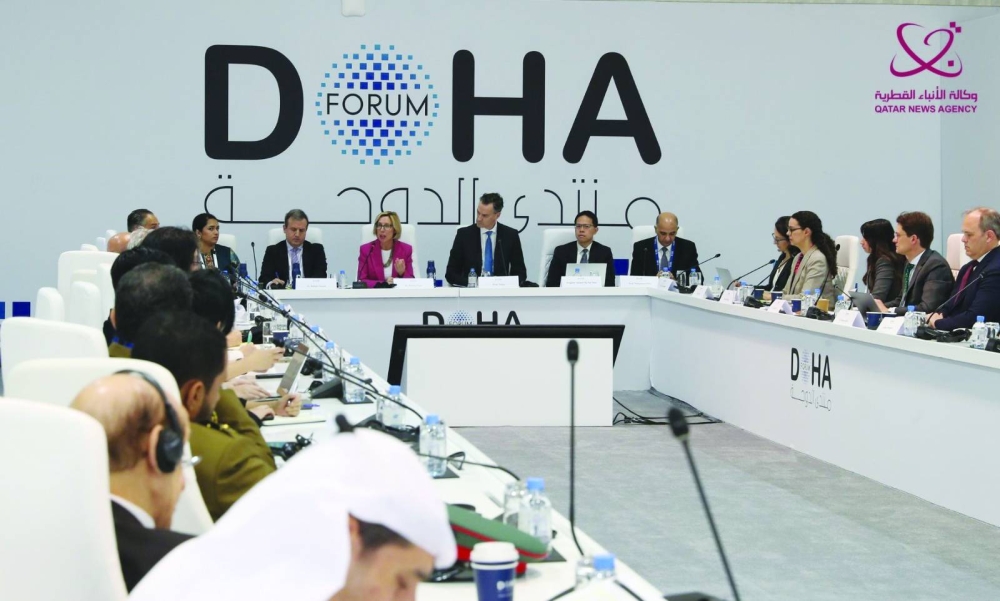Experts and specialists in artificial intelligence (AI) have called for thinking about how to turn this technology into a tool that benefits all of humanity, with a focus on bridging digital divide, combating cybercrime, and establishing regulatory frameworks to ensure its responsible use.
This was discussed during a session held Sunday as part of the Doha Forum 2024, titled "The Geopolitics of Artificial Intelligence." The session explored the geopolitical implications of this emerging technology, its growing influence on global power dynamics, its transformative potential to improve quality of life, and the challenges posed by its rapid expansion.
Featuring President of World Economic Forum Borge Brende, Secretary-General of the Digital Cooperation Organisation Deemah al-Yahya, and Co-Head of the Goldman Sachs Global Institute and President of Global Affairs Jared Cohen, the session focused on finding a balance between the opportunities AI presents and the challenges it imposes, particularly amid the rising geopolitical rivalry between major powers such as the US and China.
The session emphasised that countries that effectively invest in AI will see a boost in their global influence, while those that fall behind in this area may face negative impacts on their economic and social stability.
In this context, the President of World Economic Forum explained that countries with the financial resources and energy capacity to develop AI will be better positioned to lead in this field. He pointed out that developing countries face significant challenges due to a lack of basic infrastructure, such as electricity and internet access, which limits their ability to participate in the global technological revolution.
He also noted that these challenges mean that countries lacking these resources could fall further behind, stating there is a fear that the gap between developed and developing nations will continue to widen unless we can turn AI into a tool for balance rather than a source of division. He further stressed the urgent need for international cooperation to reduce this disparity and ensure that everyone can benefit from AI's potential.
Deemah al-Yahya highlighted the significant gap in access to modern technology between countries. She explained that the digital divide, particularly in regions like Africa, poses a major obstacle to utilizing AI, stating that in Africa, only 20% of the population has access to the internet, explaining that without electricity or infrastructure, AI cannot become a tool for progress, and that this gap threatens to exclude millions of young people with exceptional technical abilities.
She added that AI has vast potential to improve lives if used correctly, offering examples of how it can enhance healthcare in rural areas and improve education by providing virtual lessons from global experts. However, she stressed that tapping into this potential requires global cooperation to close the digital divide and ensure equitable technological development.
Co-Head of the Goldman Sachs Global Institute and President of Global Affairs Jared Cohen addressed the risks posed by cybercrime, noting that losses from these crimes could reach $10tn annually by 2025. He emphasised that major powers like the US and China must agree on strong measures to combat these crimes.
He added that all must recognize that cybercrime is a threat to everyone, and that cooperation in this area is not a luxury but a necessity. If major powers can agree on measures to curb cybercrime, it would be a crucial step toward safer and more effective use of AI.
In discussing the competition between major powers, the speakers compared the AI race to the post-World War II nuclear arms race, pointing out that the international community had, to some extent, managed to establish treaties to limit nuclear proliferation. They suggested that this could serve as a model for regulating AI.
However, Brende pointed out that reaching treaties to regulate AI might be more complex due to the rapid pace of technological advancements. He warned that unlike nuclear weapons, AI holds tremendous positive potential, but without clear regulatory frameworks, the world risk turning that potential into tools for conflict rather than progress.
The session concluded by emphasizing that investing in the Middle East presents a unique opportunity for nations seeking to leverage AI, given the regions abundance of affordable energy and infrastructure capable of executing large-scale projects quickly. The potential for using advanced technologies in areas like water desalination and data center cooling was also highlighted. It was noted that data is now the "new oil" in the age of AI.
In closing, the session stressed the importance of balancing competition and cooperation in AI use, emphasizing that the race to dominate this technology should not come at the expense of developing countries or global stability, and that the future depends on the ability of all nations to work together to develop AI responsibly.

Participants underline governance of AI to protect global security
